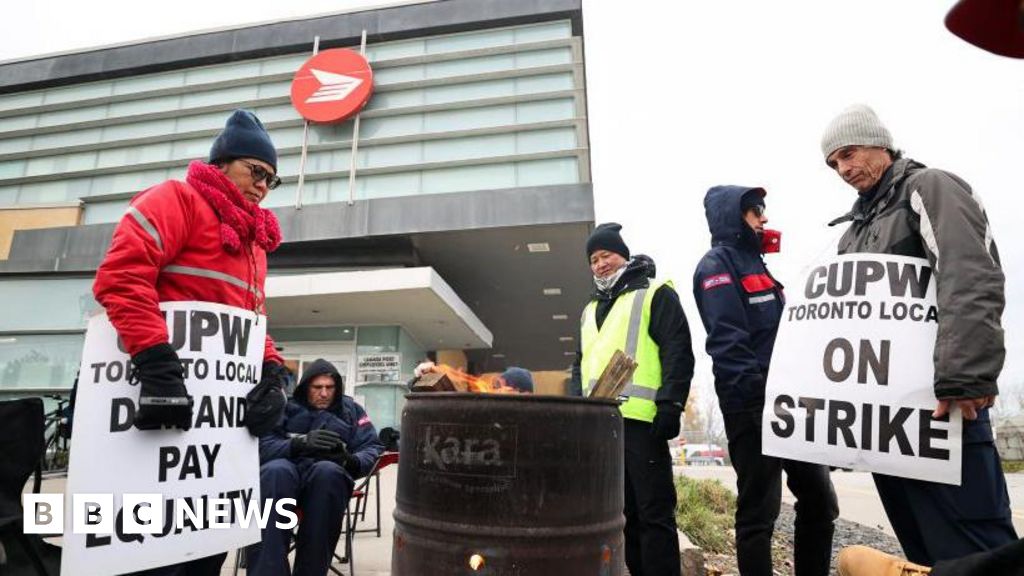Shopping
Canada Post strike strains Christmas shopping season

 Getty Images
Getty ImagesIt’s one of the biggest shopping weekends of the year, but for many Canadians, this year’s Black Friday deals may not arrive before Christmas – and that could be a death knell for already hard-hit small businesses.
Two weeks into a national postal service strike at Canada Post, and many businesses say they’ve suffered steep financial losses as customers have had to wait for their orders. Inventory sits in warehouses across the country and shipping costs have increased.
Lorne James, who owns Otter Valley Railway, a model train company in London, Ontario, estimates he’s lost C$120,000 ($85,600; £67,200) in sales since the strike began.
“It’s going to wipe out a good number of businesses,” he told the BBC. He estimated that about 80% of his orders are received online, and up until two weeks ago, 99% of his deliveries were done with Canada Post.
Negotiations between the company and the Canadian Union of Postal Workers (CUPOW) have broken down, amid massive financial losses, especially over the issue of allowing temporary workers to help expand the company’s delivery to seven-days-a-week.
 Otter Valley Railway
Otter Valley RailwayBruce Winder, a Canadian retail analyst, said that while the growth of online shopping has led to new courier companies entering the market, Canada Post is often the most affordable, and has the network to deliver in rural areas many other companies won’t.
The strike could not come at a worse time, Mr Winder said. For companies that sell things that can be gifted, Christmas sales can account for 30-40% of their annual revenue, he told the BBC.
He also predicts that this year, Canadians were already planning on spending less, because of the rise in the cost-of-living.
“It’s a double whammy, you know, because they’ve got the Canada Post strike and they’ve got sort of negative consumer sentiment,” he said.
Mr James said he’s doing better than most, because he negotiated contracts with other delivery services prior to the strike – but shipping overseas with a different carrier was too expensive, which has him losing out on some orders this holiday season.
In an open letter, Canadian company Shopify, which helps businesses set up online stores, urged the government to intervene to “prevent a devastating blow to Canadian small businesses at their most critical time of year”.
The letter came after the federally appointed mediator suspended talks on Wednesday.
“His assessment is that parties remain too far apart on critical issues for mediation to be successful at this time,” said Labour Minister Steven MacKinnon on X.
The union says it is bargaining for inflationary pay rises, better benefits, and for the company to agree to not hire outside-contractors. Meanwhile, Canada Post says it needs to have more flexible work hours – and hire more temporary workers – in order to move to seven-day delivery and be more competitive.
 Getty Images
Getty ImagesThe union told the BBC the current standstill “didn’t need to be this way”.
“[We] only took the difficult decision to call a strike after Canada Post announced the end to the existing collective agreements, an end to health benefits and to lay-offs,” the union said in a statement.
The statement said that postal workers are “deeply aware” of the hurt the strike is causing communities, pointing to its decision to delay contract negotiations so workers could deliver throughout the pandemic.
It said the company is trying to replace full-time unionised jobs with temporary “gig” workers.
In a statement to the BBC, the company said it understands the impact this strike is having on Canadians, but that they could not afford to not make transformative changes.
“With mounting financial losses in the billions, Canada Post requires greater flexibility to its outdated, mail-based delivery model. This is about the future of the postal service and growing revenues by better serving Canadians.”
The union, meanwhile, said it believes the company can be profitable without gig work, and pointed to its proposal to adopt the UK model of having the post office offer low-fee mail banking.
At issue, says Carleton University public policy professor Ian Lee, who has spent several decades researching the country’s postal service, is the very survival of Canada Post itself.
“It’s Armageddon,” he told the BBC, comparing the fate of Canada Post to that of Blockbuster Video.
Canada Post, which is a for-profit company owned by the federal government, posted a C$749m loss during the 2023 fiscal year.
The company’s biggest business used to be delivering letters – but letter volume has dropped from 5.5 billion pieces in 2006 to 2.3 billion in 2022 with the rise of the internet, according to the company’s annual report.
Although parcel delivery has greatly increased with the advent of online shopping, they face stiff competition in the field, especially from Amazon, which uses its own couriers for many of its orders.
The United States Postal Service (USPS) has faced similar issues, reporting a $9.5bn net loss during the last fiscal year.
On Friday, the USPS announced it was pausing accepting mail destined for Canada due to Canada Post “indicating that they are unable to process or deliver international mail or services as a result of the ongoing national strike”.
But as the strike has dragged on, Canada Post’s financials have deteriorated even further. The company says it has delivered 10 million fewer parcels since the strike began. It began temporarily laying off striking workers this week, a move the union has called illegal.
Canada Post has said the lay-offs are in accordance with the Canada Labour Code.
 Getty Images
Getty ImagesSome businesses say the strike has led them to reconsider who they hire to do their deliveries.
“We’re looking very hard at other parcel delivery services for the future,” said John Barrett, director of sales and marketing for Vesey’s Seeds, Canada’s largest mail-order garden business.
“I’d say their future is very dim.”
He said he has 250,000 seed catalogues sitting in a warehouse unable to be delivered, which means he’s not only paying extra to store them, but he’s missing out on big business because his customers don’t have a catalogue to order from.
Earlier this month, the labour minister issued a back-work-order to end a ports strike. But there is no sign that the government is willing to intervene in the postal workers strike.
When the BBC asked for comment, MacKinnon’s office pointed to an interview the minister gave to Radio-Canada, where he said: “This is a turning point for Canada Post and it is essential in my opinion that the employees, their union and the corporation agree on the path to follow for the future.”
On X, MacKinnon also wrote that “as in all disputes, they alone are responsible for the consequences of this conflict, and for its resolution”.
That response isn’t sufficient, said Mr Barrett.
“It’s just remarkable that they’re allowing this to last as long as they’ve had with absolutely no indication whatsoever that they’re going to resolve it at any point in time,” he said.
“It’s time for government to act. I blame government more so than either the post office or [the union].”










